My name is Brent Baccala. Some of you know me only as the man in the white robe holding the sign that reads “Surfing the Nations is a Fraud”. I don’t particularly like the sign, but it’s been given to me by God. I’d rather just stand in front of Surfer’s Church with a microphone and preach, but Tom Bower will not allow that to happen. Let me explain, briefly, my history with STN, tell you what has happened over the last month, and summarize the message that I wish you to hear.
Give up everything you have
Luke 14:33
How are we to understand this passage? First, note that Jesus is talking about discipleship, not salvation. Salvation is being saved from sin and evil, it is deliverance from destruction. A disciple is a convinced adherent of Jesus Christ, who accepts and assists in spreading his doctrines (the definitions are from the Merriam-Webster dictionary). The difference is that you might be able to enter heaven (salvation) without becoming a disciple of Christ. More on that later.
Enter through the narrow gate
“Enter through the narrow gate. For wide is the gate and broad is the road that leads to destruction, and many enter through it. But small is the gate and narrow the road that leads to life, and only a few find it.
Matthew 7:13-14
How are we to understand this passage? It certainly doesn’t read as a ringing endorsement of democracy! Indeed, the Bible warns us to be wary of populist thinking, and indicates that most people in this world are headed for destruction.
Convicted!
So we lost.
We had debated for months over whether to represent ourselves or to use our court appointed attorneys. At first, I expected to go pro se, partly because I only met Bryon Collins on the day before the trial was scheduled to start in August. John had initially expected to let Justin Tapp represent him, but in the weeks approaching our new, February court date had strongly advocated for self-representation. That was fine with me, and for the same reasons – Christ promised that when called before courts, we, not our lawyers, will be given the words to say.
“When you are brought before synagogues, rulers and authorities, do not worry about how you will defend yourselves or what you will say, for the Holy Spirit will teach you at that time what you should say.”
(Luke 12:11-12)
Mistakes were made, but overall I was pleased with our conduct. We three prayed together on every break in the court proceedings, and I’d rather go through a trial like that than with the most experienced barristers that have every argued in Old Bailey.
Video Exhibits
Cloud Computing
Cloud computing has become one of the biggest buzzwords in IT. What is it? How does it work? Is it for real?
Winter Protest
Yesterday we were back in court for oral arguments on the pre-trial motions. Judge Motyka ended the hearing by saying that he’d take it under advisement and rule in two to three weeks. I’d spent Friday afternoon with a sign on Town Square, but haven’t been back this week.
What, then, is Occupy? What are we trying to achieve?
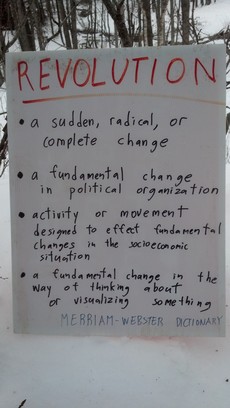
Occupy is a revolution. Occupy seeks to achieve an anti-capitalist revolution in the United States.
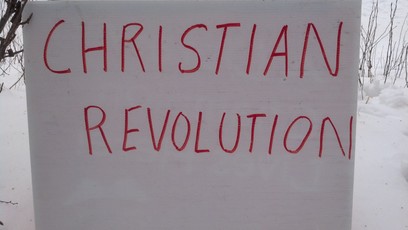
It has to be a Christian Revolution, though. Only God can lead an opposition against a government determined to use S.W.A.T. teams to break up grassroots street demonstrations. It’s not enough to be against something, either. We have to state what we’re for.
First and foremost, Godly leadership. Governors, legislators, executives, business owners, men and women who kneel before God and seek to know and do his will. Everyone, ideally, should become a disciple of Christ! I’d love to see a world where every man, woman, and child commits their lives wholeheartedly to God. Failing that, at least the leadership should be Godly.
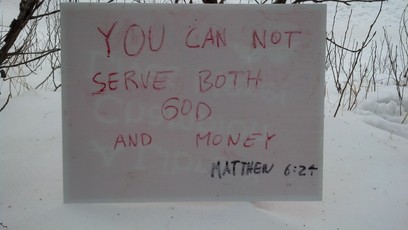
I’d like to provide free housing, free food, free energy, free transportation, free technology, free education. Why?
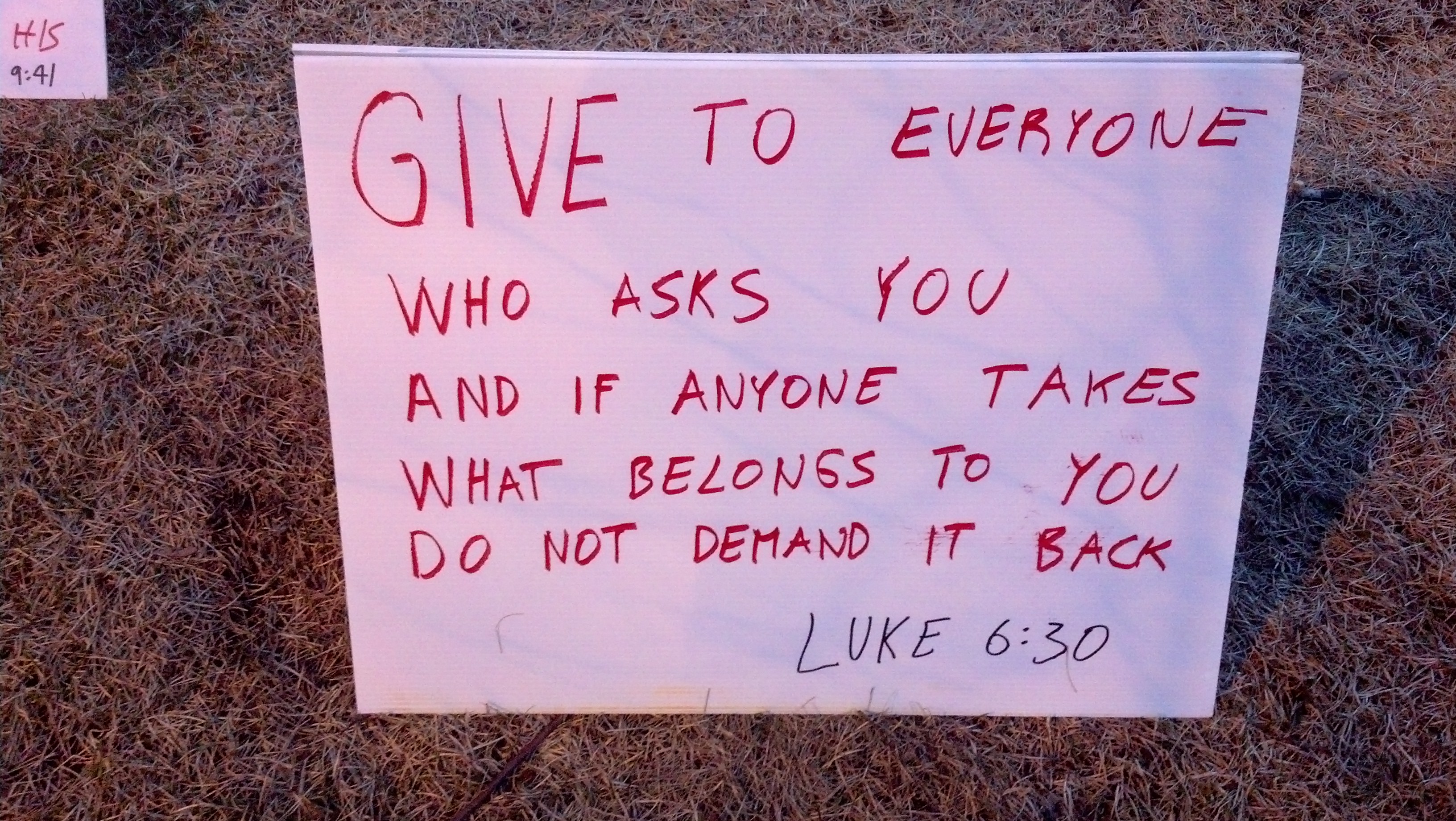
I can’t do it myself! I want to live in a society where people choose to give all of these things voluntarily. How do we pay for it all? Not through taxes! Not through borrowing! Only by voluntary charity, by gifting our time, our money, our resources. That’s a big change from what we’ve got now. That’s a revolution!
…and if the United States won’t go for it?
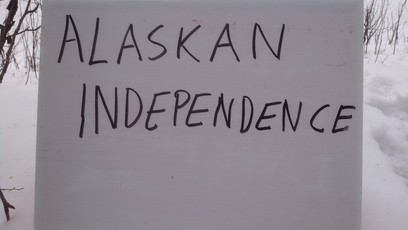
How do we achieve this? By bringing 100,000 people up here from down south and wining the 2014 election.
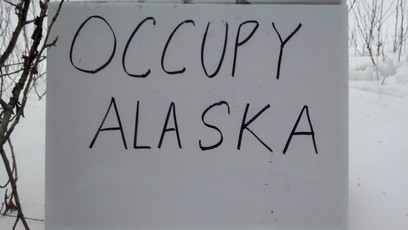
The next step is to win this court case. I want to obtain a court order prohibiting the police from evicting political demonstrators from Town Square, then build up an opposition camp that can’t be ignored by the media, and start pitching a simple line:
“Come to Alaska. Come to Alaska. We’re occupying Alaska. Just come to Alaska.”
Campfire
Anchorage’s laws are not reasonable, but their firemen (eventually) are.
The “TL;DW” (too long; didn’t watch) summary:
- The Anchorage Assembly has passed laws to ensure safe fires.
- There is no objective standard for what constitutes a safe fire.
- The only standard is that fires must be in approved containers.
- The only approved containers are corporate products.
- Someone made an anonymous report of an “illegal” fire.
- This group of firemen eventually used a reasonable standard to determine that this fire was, in fact, safe, even though it was not in an approved container.
Delay!
We went to trial last week and the verdict was… a delay!
Actually, we didn’t get close to a verdict. We didn’t even make it to jury selection.
Scott Christiansen was there, and wrote a nice piece for the Anchorage Press that presents a nice, balanced view of what happened in court last Tuesday morning:
For my own part, I’ve been busily preparing for the trial, and have neglected other duties, like updating this blog. I’ll make up for it by replacing freesoft.org’s lead video, which will eventually be called “Defense Exhibit A”, with “Defense Exhibit B”, an hour-long review of what happened to Occupy two years ago:
Testimony 43
I was raised in a Christian home, by my mother who was active in church life and took me to the local Lutheran church almost every Sunday. I well remember Sunday school, confirmation, Luther League. We learned all the basic Bible stories. What I don’t remember well are doctrinal issues, or any deep discussions on discipleship or religious vocation. It seemed that you could live a comfortable life in a suburban community with no deep crises of faith, and I accepted this at face value. I’m sure it helped that my parents enjoyed a solid marriage, had no problems with drugs or alcohol, and provided me with a middle class lifestyle – a house, a computer, a car when I turned 16. I did well in school, though I didn’t particularly care if my grades were exceptional. My academics were good enough to get me accepted to MIT, although I chose to go to Maryland instead. Who cared if Bill Rivers got straight A’s and was valedictorian?
I went to college; my parents paid the bill. I studied physics, learned it reasonably well, and finally dropped out because I had a decent job working with the burgeoning Internet technology. At this time I wasn’t a regular church goer, didn’t join YWAM, and never considered for one minute going off on a mission trip to Africa.
I did work with free software.
I learned everything I could about Unix. I was an early adopter of Linux and it became my operating system of choice by the time I was 23. I dabbled on one software coding project after another, and founded a website (freesoft.org) that I still operate today. I attached no profound religious significance to this at the time, but by the time I left college I had found a career path. I wanted to write software and publish it for free on the Internet.
Something was lacking, however, and it wasn’t just the money I couldn’t make giving everything away for free. I didn’t know what it was. I decided to ride a bicycle across the country. Why? Who knows? My father asked me what I was trying to prove, and I had no answer. I wasn’t trying to prove anything! I know now that I was being led by the Holy Spirit, and at the end of that trip from New Jersey to Arizona I had one of the most profound spiritual experiences of my life.
I had a revelation from God! “Your problem is that you’re trying to do everything yourself and not relying on me.” I responded by giving away the bike and everything else and started to walk through the Arizona mesa. I wish I could say that I kept walking. Instead, I wrote the following in Bicycling across America:
I was afraid that if I kept walking, I was afraid I would find my calling, and I was afraid of knowing what it might be…
That day, I broke down. I got money wired to me and was on a bus by that evening. I had discovered that a part of me, much stronger that I thought, wanted nothing to do with grand visions of any kind. I wanted my family and friends, didn’t want to be rich, but didn’t want to be poor, wanted to write software, play music, cook nice meals and certainly not wonder all over the country.
I returned to a somewhat conventional life, though I must say that I felt deeply unfulfilled. I could never find a place to fit in. I lived in Mexico for a year, spent a summer at a religious community I had visited on the bike trip, worked on various odd computer projects, most notably assembling some essays into Connected: An Internet Encyclopedia.
Within four years I had reached a crisis. It came one evening in the spring of 1997, when I heard a knock at the door of the friend’s house where I was couch surfing. I opened the door to be faced with a dozen armed police officers executing a search warrant on my friend, who was also a small time drug dealer.
There were now no two ways about it. The raid pushed me over some kind of internal ledge. I was enraged at the society I lived in, that left me homeless because I didn’t make money on free software and declared war against its own people because of what they smoked. The choice was either to act out against the government or to let it go. Should I blockade the capital’s subway system to force the government to end the drug war? Instead, I turned to God, prayed, fasted, and was baptized in a lake in Ohio. I was 27 years old.
Looking back now, it was one of the most decisive events of my life. Given the choice of doing things my way or God’s way, I chose God’s way. I can’t always figure that out. I don’t always get it right. I neglect my prayer life. I wander off on my own. Yet the intent has been clear since that Sunday morning in 1997.
Within a few more years I had moved back to my parent’s home and spent most of my thirties there, studying mathematics. I still enjoy math, and I still hope to achieve significant results in that field, but by the time I turned forty I knew that math wasn’t it. I was still deeply dissatisfied with the progress of my life. Perhaps God was dissatisfied, too. I think he expects something other than solving Schrodinger’s equation.
So I set to work finishing a novel that I had been working on for years, a tale of anger and of love, of redemption and of revolution. The hero steals billions of dollars to fund his private dream of being the first man to walk on Mars, but that plan only leads to disaster. He changes, and embraces Christ. Think of it as Moby Dick, in space, and Ahab starts listening to Starbuck halfway through.
Another theme worked its way into my book, that of revolution! By the time Captain Mercuriou returns to Earth, he’s proposing Hawaiian secession and independence instead of flying to Mars as a more viable solution to our problems of populism, greed, and violence. I didn’t plan it that way. I did pray regularly as I was writing, and have finally concluded that it was God who gave me the ending to Icarus’ Wing.
Since I was proposing Hawaiian secession in my novel, it made sense to actually move to Hawaii, and that I did in late 2010. Actually, I wasn’t sure if Hawaii or Alaska was the better choice for a Christian revolution, but I decided to start with Hawaii. I was at least able to better work some Hawaiian setting into my novel by actually going there.
I lived on the North Shore of Oahu for eight months, made good progress on the novel, but didn’t quite finish it. As I was running out of money, I turned to the local Christian community for help. It’s still a bitter memory. One minister suggested that I get a job. I told him that I was writing a book. He thought for a second, then asked “How much money does it make?” That was his only question about Icarus’ Wing. He didn’t ask why I was writing it; nothing about my relationship with God; didn’t ask to read what I had written. He preaches to the youth.
After Hawaii, God led me to Alaska, to Occupy, to 2012. It’s a story I’ve told in My Confession. Occupy should have become the great Christian political opposition of 2012. Instead, it collapsed into street riots because nobody stood up to lead it. Instead of going to Anchorage, where God had guided me, I went to Fairbanks and spent a fatal month there, occupying instead of preaching, and talking in a General Assembly instead of making speeches on the street corner.
America has turned away from God, abandoned Gospel obedience in favor of freedom, and developed a cynical philosophy of leadership based on economic and military domination of anyone who opposes “the majority”. Between the people who really believe in this, and the people who just keep working their jobs and voting for the corporate candidates, they are the majority.
I am now more convinced than ever that an Alaska Revolution is ordained by God. The plan is simple. Convince a quarter million Christians to pack up, move to Alaska, and become the majority in this state. The hard part is getting the media coverage necessary to convey that plan to the nation. It’s impossible, really. Only God can truly lead this revolution.
My prayer dialog currently goes like this. Please God, I can not bear this sorrow. Please Father God, either kill me or revive this opposition. I can not bear this sorrow, God, I can not bear this sorrow. Let me take my own life, give me permission and means to take my own life. Thy will be done. Thy will be done. Please God, please God, I can not bear this sorrow, I can not bear this sorrow…
My direction is forward, despite failure, despite hardship, despite hopelessness and despair. “Finish what you’ve started.” By the grace of God, and through no power of my own, I will.